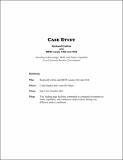| dc.description.abstract | The post-September 11th economy has confronted Rockwell Collins in Cedar
Rapids, Iowa with hard choices. Faced with the need to cut costs, including
laying off significant portions of the work force, the company and its unions
still maintain a commitment to knowledge
retention and knowledge building. This case
study chronicles the efforts of this leading
producer of advanced communication and
aviation electronics for the commercial market
and the defense industry to balance the costs of
maintaining productive effectiveness while
responding to market pressures. The company is
faced with increased technical requirements and
depressed demand for its products, which
include: in-flight entertainment systems, aircraft
communication systems, global positioning
systems (GPS), flight deck displays (including collision alert systems and
virtual landing aids), communications systems, and automatic flight controls.
Survival depends on walking a strategic knife edge to sustain the bottom line
and still maintain the innovation and flexibility needed to build products to
market demand. | en_US |
